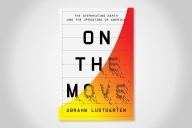You have /5 articles left.
Sign up for a free account or log in.
Last week, George Washington University senior and reporter for the GW Hatchet Alec Rich interviewed Eddie Maloney and me for the student paper's podcast.
The podcast episode is titled "Getting to the Bottom of It": The pandemic's impact on higher education.
As someone who asks questions for a living, I was hugely impressed by Alec's questions.
Alec is asking the right questions about higher education after COVID-19. His questions are a good reminder to all of us to ensure that students have a seat at the table as we figure out what comes next.
Here are Alec's questions. How would you answer them?
Q: Do you believe we’re at a turning point in higher education as far as how the decisions made at this moment will influence the learning environment not just post-COVID, but for years down the line?
Q: What do you expect the post-COVID academic landscape to realistically look like on a day-to-day basis for a school like GW and what are some factors to consider?
Q: Do you believe methods like altering the academic calendar or opening up virtual options for certain classes may lead to any kind of enrollment growth? That seems to be a major issue as far as making up for this budget shortfall and working to bring more students into the fold.
Q: How do faculty and staff play into this? Obviously, they make up a large part of this new academic task force, but if their concerns aren’t then translated into university action, it could lead to problems. So first, how important are faculty to helping design this post-COVID environment and how seriously should the university weigh their input?
Q: I think it’s also important to mention the inequities in higher education that COVID-19 exacerbated to some extent, which I know is something you two have discussed as well. So how can this post-COVID academic landscape take some of the things we’ve learned in this virtual environment and use that to improve equity moving forward?








